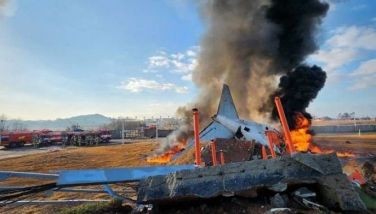Syrian refugees in Turkey reach 150,000
SURUC — Refugees streaming into Turkey from Syria say their home city, once bustling with 400,000 citizens, has become a ghost town, emptied of all people but a few thousand fighters trying to hold off an onslaught by Islamic militants.
The masses fleeing the brutal offensive by the Islamic State group on the city of Kobani, looming just across the border from Turkey, are part of a wave that has reached 150,000 people since Thursday. Turkey had taken in well over a million Syrian refugees from the 3 ½-year-old conflict already before the latest wave, but this influx is the largest yet, according to the UN refugee agency, UNHCR.
Arriving weary in Turkey yesterday — some walking, some limping, some on stretchers — the refugees brought with them stories explaining why so few remain behind in the besieged city.
Osman Nawaf, 59, said that he saw about fifty dead bodies hanging headless in a village called Boras that he passed on his three-day walk from a village on the outskirts of Kobani.
Leyla Kuno, a 55-year-old mother of 10 children, said only the fighters remain in the city.
"I came today only because there is no one inside our city," she said.
Kurdish forces trying to fend off the Islamic State on yesterday expressed hopes that the airstrikes carried out by the United States and five Arab countries against the militants might provide yet provide relief.
Nawaf Khalil, a spokesman for Syria's Kurdish Democratic Union Party, or PYD, said airstrikes targeting the Islamic militants would "help" his party's armed wing in Syria. But fighters staring out at the militants in Kobani said they have seen no let-up so far.
The US and five Arab nations attacked the Islamic State group's headquarters in eastern Syria in nighttime raids using land- and sea-based US aircraft as well as Tomahawk cruise missiles launched from two Navy ships in the Red Sea and the northern Persian Gulf.
But the bombs did not fall on Islamic State group positions near Kobani. One Kurdish fighter protecting the city, reached by phone near the front line, said that the airstrikes had yet to diminish his enemies' attack, but said that he hoped that it would eventually hinder resupply of heavy weaponry.
It was not immediately clear why the US and allies did not hit the forces besieging Kobani, given the magnitude and urgency of the humanitarian disaster the militants are causing.
Selin Unal, a spokeswoman for UNHCR, which has been assisting the Turkish government in caring for the refugees, called the migration in the last few days: "Probably the biggest wave in the region over a short period, and certainly the biggest for Turkey."
She said that the needs for the refugees were so huge that her organization was considering airlifting in supplies from other countries. She praised Turkey's efforts and pleaded for help from abroad, noting that despite taking in the largest number of refugees in the region, Turkey has been receiving less support from abroad than neighboring countries coping with refugees.
Many of the refugees at an intake center manned by the Turkish relief agency, AFAD, noted that the fighters are protecting their homes and expressed hopes they would be able to resume their lives in Kobani soon.
Many also expressed reluctance about coming to Turkey.
Hussain Mohamed Ibn Mustafa, a middle-aged fighter, who had escorted his family across the border to visit a sick brother in a Turkish hospital, said that life had been good in Kobani until this last week and that his family now dreaded life across the border.
"We are like prisoners here," he said. But he said he would go back soon to fight, noting that Kobani is a strategic town for the control of the Syrian Kurdish region.
"If we lose Kobani it means we have lost Kurdistan," he said.
The developments across the border are also flaring tensions in Turkey. Abdullah Ocalan, the imprisoned leader of a Kurdish rebel group fighting Turkey for autonomy has now called for a mass mobilization of all Kurds against the Islamic State group.
Ocalan, who is serving a life sentence on a prison island near Istanbul, leads the Kurdistan Workers' Party, which has long fought Turkey for autonomy and is affiliated with Syria's Kurdish Democratic Union Party.
The call could raise tensions at the border where Kurds have clashed with Turkish security forces. Near the frontier, hundreds of Kurds from Turkey have fought with Turkish police firing tear gas and water cannons. The Kurds say Turkey is hampering their efforts to enter Syria and help their brethren.
The area around Turkey's border town of Suruc was heavily militarized on yesterday with armored vehicles, though clashes had subsided.
- Latest
- Trending































